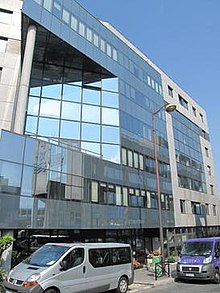Dargaud
| Parent company | Média-Participations (1988–present) |
|---|---|
| Founded | April 1936 in the 18th arrondissement of Paris |
| Founder | Georges Dargaud |
| Country of origin | France |
| Headquarters location | Paris |
| Publication types | Books |
| Fiction genres | Comics |
| Imprints | Dargaud-Lombard Dargaud Suisse Dargaud Media Ellipsanime Lucky Comics Media-Diffusion Mediatoon Distribution Mediatoon Licensing Urban Comics |
| Official website | www |

Société Dargaud (French pronunciation: [sɔsjete daʁɡo]), doing business as Les Éditions Dargaud, is a publisher of Franco-Belgian comics series, headquartered in the 18th arrondissement of Paris.[1] It was founded in 1936 by Georges Dargaud, publishing its first comics in 1943.
History
[edit]Initially, Dargaud published novels for women. In 1948, it started Line, a "magazine for elegant women", as well as a French edition of the Belgian Tintin magazine.
In 1960, Dargaud bought the weekly Pilote magazine from René Goscinny, Albert Uderzo, and Jean-Michel Charlier. Goscinny continued as editor of the magazine, and Charlier was comic album editor for a period. In October 1961, Dargaud published the first Asterix album.[2]
In 1967, Dargaud entered the animation production services by launching a division named Dargaud Films with the movie Asterix the Gaul. Subsequently, the company produced or co-produced several Asterix, Lucky Luke and Tintin feature films. By 1972, Dargaud along with American production and distributor United Artists produced the movie Le Viager which was directed by Pierre Tchernia
In 1974, Dargaud wanted to diversify. Pilote became a monthly magazine and spawned two other monthly magazines. The new magazines were Lucky Luke (a Western themed magazine around the comics series Lucky Luke) and Achille Talon (a humor based magazine around the comics series Achille Talon). However, both magazines could not sustain a readership and folded within a year. The comics from these two magazines were put back into Pilote.
In that same year, Dargaud announced that they had joined forces with René Goscinny and Albert Uderzo to create the Idéfix Studios, which only produced two feature films The Twelve Tasks of Asterix
In 1988, after Georges Dargaud retired his company Dargaud was acquired by Média-Participations. Two years later, it sold the weekly gardening and do-it-yourself magazine Rustica to Média-Participations as well.
In 1992, the publisher Le Lombard became a part of Dargaud, followed in 1993 by Les Éditions Blake et Mortimer. Over the course of the 1990s, Dargaud subsequently acquired several audiovisual production companies, including Citel in 1994, Marina Productions in 1997, and Millésime Productions in 1998. The latter two, specialized in television animation, joined in 1999 to create Dargaud Marina, later renamed Dargaud Media.
At the end of the 1990s, Dargaud created manga publisher Kana, followed by Lucky Comics, centered on the series Lucky Luke.
In 2003, Dargaud acquired the production studio Ellipsanime, holder of one of the most extensive catalogues of European cartoons (including Tintin and Babar).
In 2008, Dargaud founded the foreign rights agency Mediatoon Licensing, and in 2015, it joined with twelve other European comics publishing actors to create Europe Comics, a digital initiative co-funded by the European Commission's Creative Europe program.[3]
In 2014, Dargaud acquired the assets of the now defunct Moonscoop Group, which includes the rights to series such as Hero: 108 and Code Lyoko.[4]

Foreign imprints
[edit]Outside of France, imprints include Dargaud USA, Dargaud Canada, and Hodder-Dargaud in the United Kingdom.[5]
Selected titles
[edit]- Asterix - Albert Uderzo and René Goscinny
- Barbe rouge - Jean-Michel Charlier, Victor Hubinon etc.
- Black Moon Chronicles - Olivier Ledroit and François Marcela-Froideval
- Blacksad - Juan Diaz Canales and Juanjo Guarnido
- Blake and Mortimer - Edgar Pierre Jacobs etc.
- Blueberry - Jean-Michel Charlier, Jean Giraud etc.
- Djinn - Jean Dufaux and Ana Mirallès
- Lucky Luke - Morris, René Goscinny etc. (on Lucky Comics, joint venture between Lucky Productions and Dargaud)
- Philemon - Fred
- Tanguy et Laverdure - Jean-Michel Charlier, Albert Uderzo, Jijé etc.
- The Vagabond of Limbo - Christian Godard, Julio Ribera
- Valérian - Pierre Christin and Jean-Claude Mézières
- XIII - Jean van Hamme and William Vance
References
[edit]- ^ "Mentions légales Archived 2011-04-07 at the Wayback Machine." Dargaud. Retrieved on 1 May 2011. "15/27 rue Moussorgski 75018 Paris"
- ^ Maussion, Florian (22 October 2015). "DANS LE RETRO. Quand "Le Parisien" s'est renommé "Le Lutécien"". Le Parisien. Retrieved 23 December 2017.
- ^ "Creative Europe Project Results: Europe Comics". Creative Europe. Retrieved 3 March 2017.
- ^ "Moonscoop". Code Lyoko. Retrieved September 9, 2019.
- ^ Hodder Dargaud, Openlibrary.org. Retrieved August 14, 2023.
External links
[edit]- Official website (in French)
